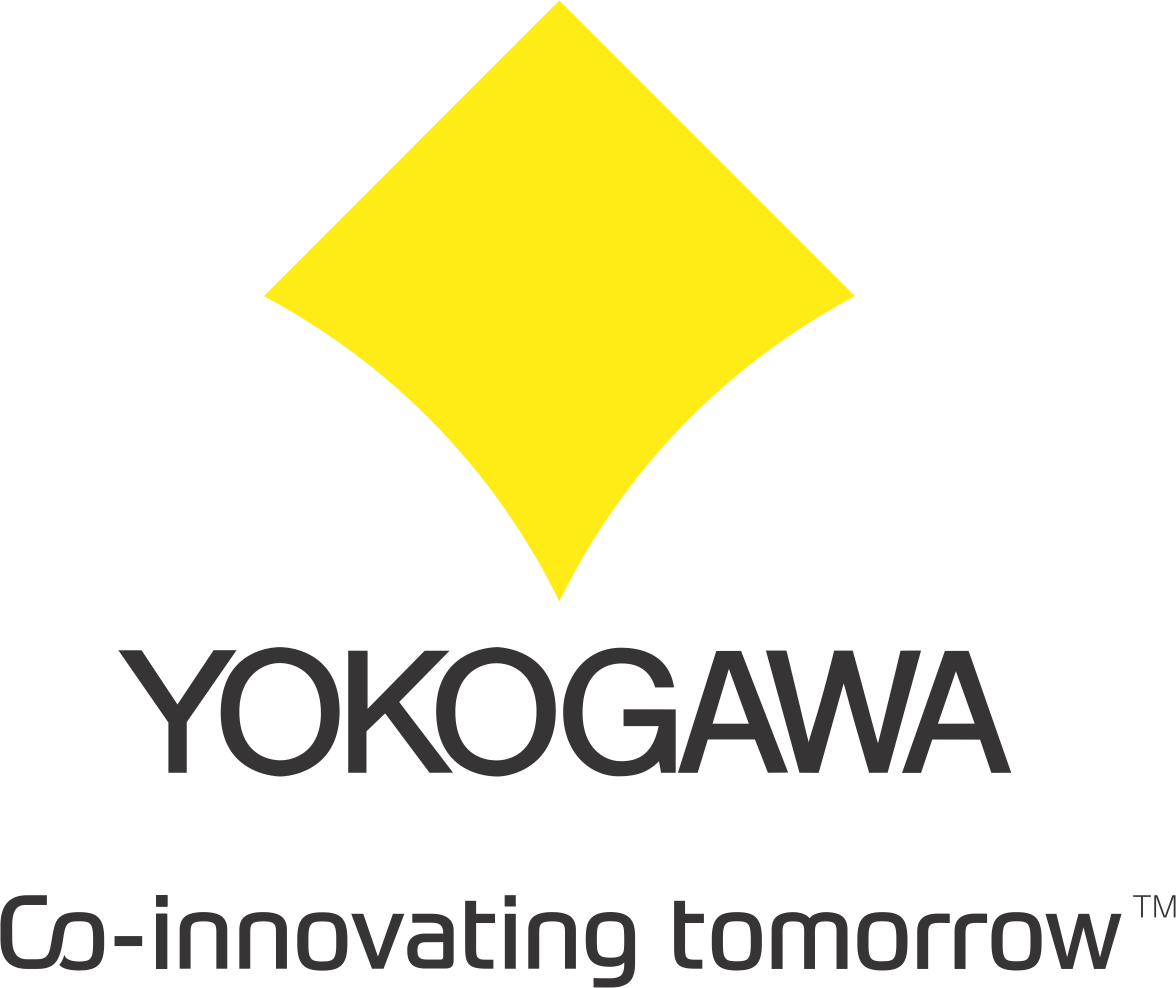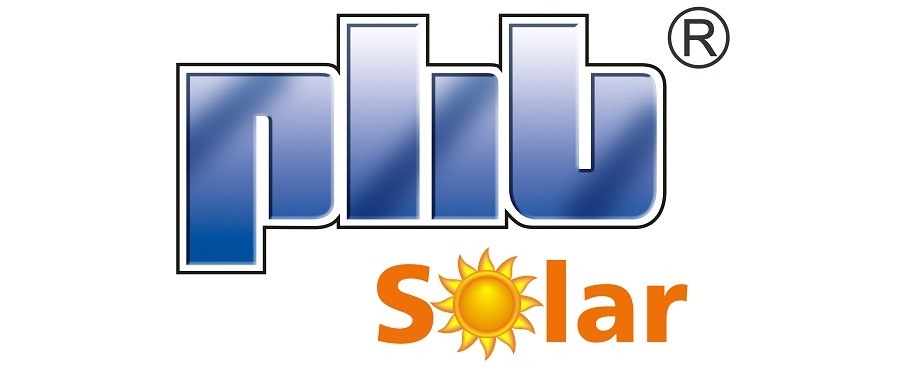Universidade Federal de Santa Maria - Santa Maria
21/10/2018 15:00 - 24/10/2018 18:30
Descrição
The 11th Seminar on Power Electronics and Control will take place in Santa Maria, RS, from 21 to 24 October, 2018. In this year, it is organized by the IEEE Organizational Units from the Federal University of Santa Maria (UFSM). The seminar’s objective is to provide interaction among academia and industry to discuss the latest cutting-edge technologies on Power Electronics, Control, Electrical Power Systems and their applications. In 2018, the conference is themed on “Connecting Academia and Industry: the Key to Technological Development”.
The event is open to the national and international community, being a great opportunity for technical discussions and bringing together researchers, engineers, entrepreneurs, and students. Through this, it links research and development to technological innovation, especially in the areas of Intelligent Systems, Power Electronics, Control and Automation, and Power Systems.
SEPOC 2018 will consist of technical sessions with presentations of scientific papers (previously evaluated by reviewers and the Technical Committee), panel discussions, special sessions, and plenary sessions. Renown speakers from around the globe will participate giving their contribution on different fields. The conference will also count with a social program including coffee breaks, an opening cocktail, and the conference dinner.
In recent years, due to the high technical quality of papers and large participation of several researchers, SEPOC has become an important event in Latin America in the area of Power Electronics, Control, Power Systems, and its engineering applications. SEPOC 2018 is organized by the IEEE/UFSM Student Branch, IAS SB Chapter, PES SB Chapter and the IEEE IAS/IES/PES/PELS Joint Chapter, which brings together four societies from the Institute of Electrical and Electronics Engineers (IEEE): Power Electronics Society (PELS), Industry Applications Society (IAS), Industrial Electronics Society (IES) and Power and Energy Society (PES). In addition, the event also counts with the support from the Graduate Program in Electrical Engineering (PPGGE/UFSM) and from the Science and Technology National Institute on Distributed Generation (INCT-GD/UFSM).
Organizing Committee
General Committee
Marco Antônio Dalla Costa, Dr.Eng. (General Chair)
Caio Ruviaro Dantas Osorio, Ms.Eng.
Program Committee
Vitor Cristiano Bender, Dr.Eng. (Chair)
João Manoel Lenz, Ms.Eng.
Technical Committee
Álysson Raniere Seidel, Dr.Eng. (Chair)
Maikel Fernando Menke, Ms.Eng.
Finance Committee – Secretary
Marcelo Freitas da Silva, Dr.Eng. (Chair)
Douglas Camponogara, Dr.Eng.
Thieli Smidt Gabi, Ms.Eng.
Infrastructure Committee
Jonas Roberto Tibola, Dr.Eng. (Coordinator)
Gustavo Guilherme Koch, Ms.Eng.
Publicity Committee
Roger Mateus Karnopp, Eng. (Coordinator)
Felipe Loose, Ms.Eng.
Scientific Committee
Adriano P. Moraes – Universidade Federal de Santa Maria
Aécio Oliveira – Universidade Federal de Santa Maria
André Luís Kirsten – Universidade Federal de Santa Catarina
André Silva – Universidade Federal de Santa Maria
Carlos Henrique Barriquello – Universidade Federal de Santa Maria
Cassiano Rech – Universidade Federal de Santa Maria
Claiton Franchi – Universidade Federal de Santa Maria
Daniel Bernardon – Universidade Federal de Santa Maria
Denizar C. Martins – Universidade Federal de Santa Catarina
Eisenhawer Moura – Universidade Federal de Campina Grande
Guilherme Sebastião da Silva – Universidade Federal do Pampa, Campus Alegrete
Gustavo Finamor – Universidade Federal de Santa Catarina
Hamiltom Sartori – Universidade Federal de Santa Maria
Jean Patric da Costa – Universidade Tecnológica Federal do Paraná
Jonas Roberto Tibola – Universidade Federal de Santa Maria
Jorge R. Massing – Universidade Federal de Santa Maria
Leandro Michels – Universidade Federal de Santa Maria
Lucas V. Bellinaso – Universidade Federal de Santa Maria
Luiz Antônio Maccari Junior – Universidade Federal de Santa Catarina
Marcelo Zanetti – Universidade Federal de Santa Maria
Maurício de Campos – Universidade Regional do Noroeste do Estado do RS
Maurício Sperandio – Universidade Federal de Santa Maria
Nelson K. Neto – Universidade Regional Integrada do Alto Uruguai e das Missões, Santo Ângelo
Rodrigo Varella – Universidade Federal de Santa Maria
Vinícius Foletto Montagner – Universidade Federal de Santa Maria
Call for Papers
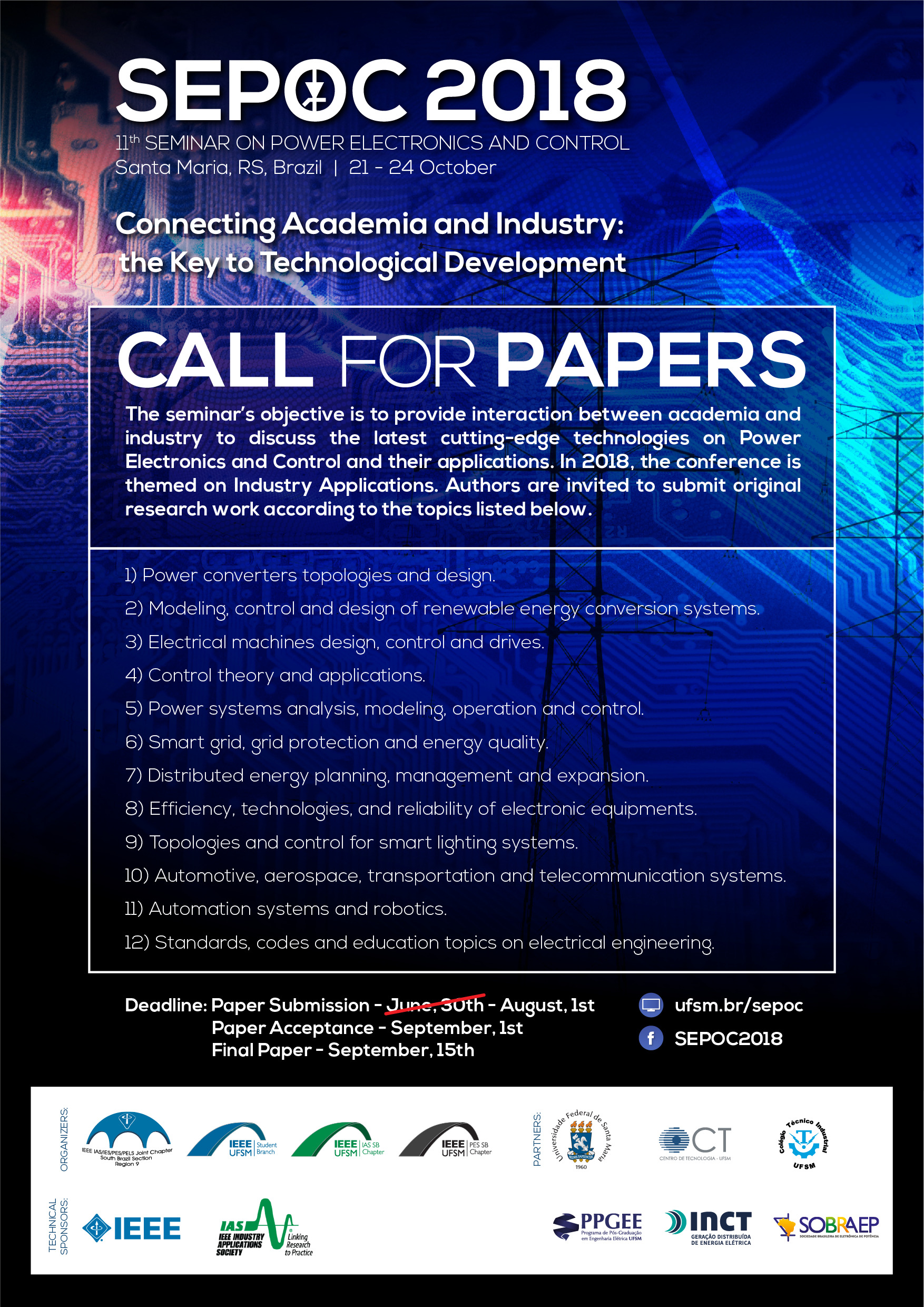
Templates
Prospective authors are invited to electronically submit full regular papers of their work. The conference will favor original papers, not previously published or copyrighted, which put in evidence partial or complete results on research areas listed in the Call for Papers.
- Papers should be between four and six pages in PDF format, according to the template;
- Research articles can be written in Portuguese, English or Spanish;
- Do not include author names, affiliations, and acknowledgments in the first version;
The templates in Word and LaTeX format are provided below:
- Word: Download
- LaTeX:
A final version of accepted papers must be submitted according to the conference deadline, in accordance with reviewers’ suggestions. Moreover, in order to be published in the SEPOC 2018 proceedings, accepted papers must be presented during the conference and at least one author must be registered for a Professional Registration.
Guidelines for Presentations
Congratulations! You are going to present a paper at SEPOC 2018 in Santa Maria.
The SEPOC committee wishes you good luck with your preparation! Much of the preparatory work will focus on small details. Consequently, do not underestimate the time this will take.
These notes have been written to help you.
Author’s Checklist:
a) At home
- prepare the presentation according to the suggested model (Template Presentation);
- make the presentation preferably in the English language;
- try out the presentation;
- be aware that you have a limited time of 15 minutes for your presentation, plus 5 minutes for discussions;
- Write your biography. The Chair will use this information to present you to the audience.
b) 15 minutes before the session
- go to the presentation room;
- meet the session chairman and/or the staff;
- bring your pendrive with your presentation preferable in file extension .pdf to upload it to the computer of the session room;
- bring your printed short biography and handle it to your session chairman.
c) At the session
- speak slowly and as simply as possible;
- stick to the time limit;
- the papers can be presented in Portuguese, English or Spanish.
Remember that we will have listeners from other countries, so try to use this opportunity to practice you communications skills in English.
The UFSM
The Federal University of Santa Maria is situated in the city of Santa Maria, in the central part of the state of Rio Grande do Sul. The city is located 290km west from the State Capital, Porto Alegre. Established in 1961, UFSM is a governmental, regionally oriented University which has as main purpose to perform teaching, research and extension activities. UFSM has as mission professional formation, generating and cultivating science and technology in the interest of regional development and the transmission of universal knowledge. It was the first Federal University established upstate in Brazil.
UFSM offers a large range of undergraduate and graduate programs, and also counts with technical schools which give opportunity for younger students to graduate as technicians in several areas. With the purpose of maintaining positive communication with its internal community and with the public in general, the University has a Radio and a TV Station and the UFSM Web Portal – www.ufsm.br
In order to support its central activities, UFSM has a complex administrative infrastructure which includes the Campus Administration Offices, the President’s Office, the University Council and auxiliary departments. On the main campus you will also find bank agencies and ATM’s, post offices, snack bars, gas stations and other facilities. Furthermore, the University counts with a School Hospital, a Veterinary School Hospital, Libraries, University Restaurants, a School Pharmacy, a Planetarium, the Gama D’Eça Museum, a Botanic Garden and laboratories in several areas.
Travel and Transportation
Santa Maria is located 290km west from the State Capital, Porto Alegre.

International Airport Salgado Filho
Porto Alegre (POA) to Santa Maria (RIA)
To consult dates and times, access: https://www.voeazul.com.br
Bus Station of Porto Alegre
Porto Alegre to Santa Maria
http://www.rodoviaria-poa.com.br
(55) 3228-0699
Bus Station of Santa Maria
Santa Maria to Porto Alegre
http://www.rodoviariasantamaria.com.br
(55) 3222-4747
Public Transportation
Access:
http://www.simsm.com.br/horarios/
Taxi – Coopaver
(55) 3302-4500
Garupa App
Uber App
Hotel Information
Park Hotel Morotin
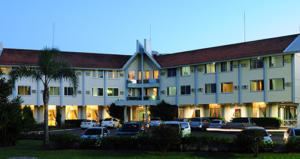
Os Hotéis Morotin estão com tarifas especiais para os participantes do SEPOC 2018. Maiores informações no link:http://morotin.com.br/parkhotelmorotin/promocao/sepoc-2018/
Address: BR 287 – KM 239 – Nº 1981
Reservation: http://morotin.com.br/parkhotelmorotin/promocao/sepoc-2018/
(55) 3220-1600
Information:
- Parking
- Breakfast
- WiFi
More access for your convenience:
- 7 km of the UFSM
- 10 km of the Airport Air Base Santa Maria
- 3.6 km of the city’s main Bus Station
Hotel Dom Rafael Executivo and Hotel Dom Rafael Express
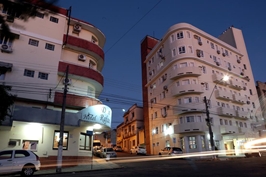
Address: Av. Rio Branco, 228 – Centro
http://hoteldomrafael.com.br/dom-rafael-executivo/
http://hoteldomrafael.com.br/dom-rafael-express-centro/
Reservation:
(55) 2101-1212 (Executivo) / (55) 2101-1920 (Express)
reservas@hoteldomrafael.com.br
Information:
- Parking
- Breakfast
- WiFi
More access for your convenience:
- 12.2km of the UFSM
- 14km of the Airport Air Base Santa Maria
- 3.4km of the city’s main Bus Station
Altadomo Hotel Santa Maria
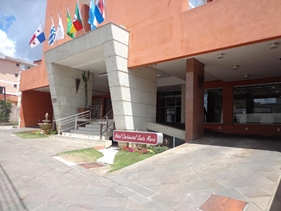
Address: R. Benjamin Constant, 1209 – Nossa Sra. das Dores
http://www.altadomo.com.br
Reservation:
(55) 3028 7070
reservas@altadomo.com.br
Information:
- Parking
- Breakfast
- WiFi
- Indoor swimming pool
More access for your convenience:
- 10km of the UFSM
- 12km of the Airport Air Base Santa Maria
- 2.9km of the city’s main Bus Station
Itaimbé Palace Hotel
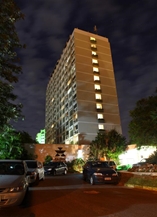
Address: Venâncio Aires, 2741 – Centro
http://hotelitaimbe.com.br/hotel-itaimbe-santa-maria/
Reservation:
(55) 9216.2785 / (55) 3220.1144
Information:
- Parking
- Breakfast
- WiFi
More access for your convenience:
- 11km of the UFSM
- 13km of the Airport Air Base Santa Maria
- 2.9km of the city’s main Bus Station
Hotel Morotin
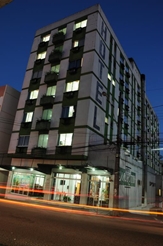
Address: R. Ângelo Uglione, 1629 – Centro
http://morotin.com.br/hotelmorotin/
Reservation:
(55) 3220-5200
Information:
- Parking
- Breakfast
- WiFi
More access for your convenience:
- 11km of the UFSM
- 13km of the Airport Air Base Santa Maria
- 3.2km of the city’s main Bus Station
Pousada Dom Alcides
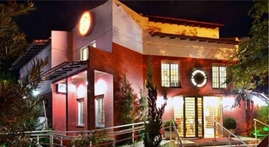
Address: R. Rogério Tochetto, 495 – Ns. de Lourdes
http://www.pousadadomalcides.com.br
Reservation:
(55) 3222.4174
Information:
- Parking
- Breakfast
- WiFi
More access for your convenience:
- 10km of the UFSM
- 12km of the Airport Air Base Santa Maria
- 220m of the city’s main Bus Station
Event Map
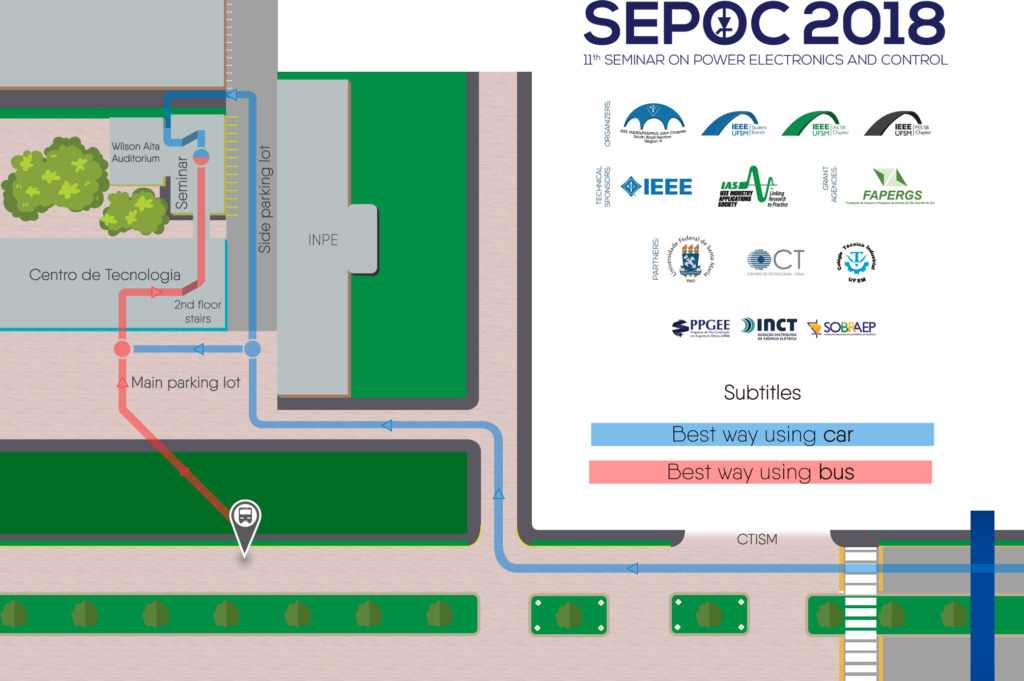
Media
Programação
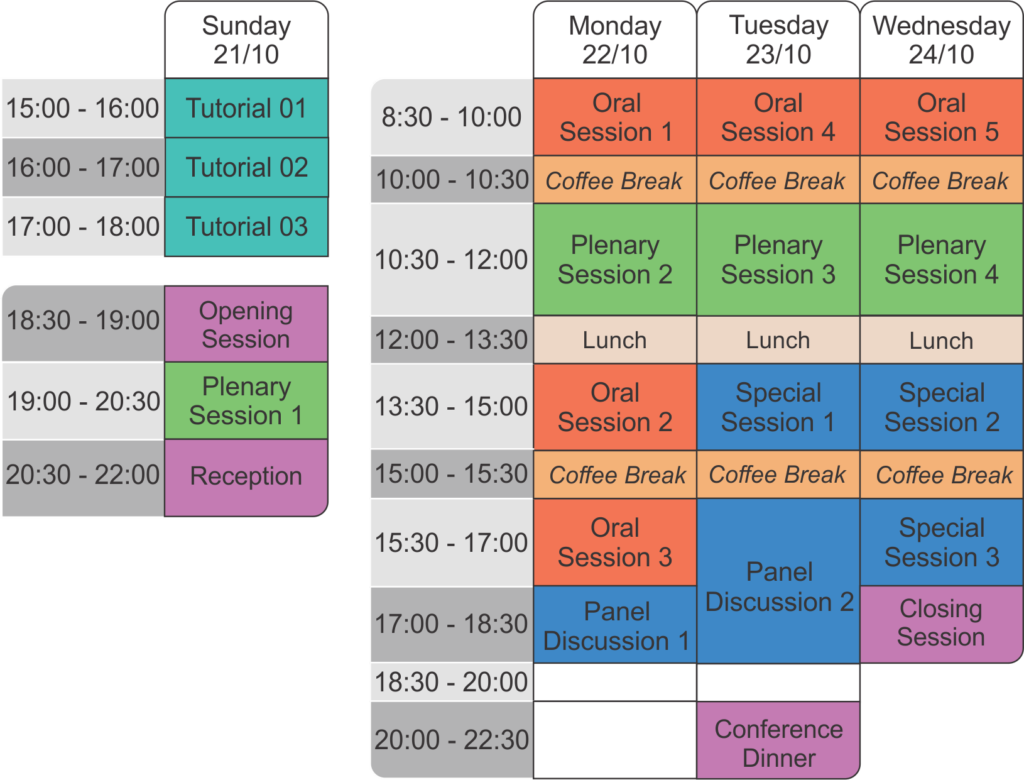
Tutorial 01: Baterias de lítio-íon, a eletrônica e a química trabalhando lado a lado
Abstract: A intermitência das fontes renováveis sempre foi fator crítico para sua consolidação na base das matrizes energéticas. Contudo, o desenvolvimento de sistemas avançados de armazenamento de energia e a queda expressiva dos custos das novas tecnologias têm contribuído significativamente para a transformação deste cenário. Dentre as diversas tecnologias que vêm sendo empregadas, as baterias de lítio-íon surgem como uma excelente alternativa devido a sua densidade energética elevada e alta eficiência. Este tutorial irá apresentar uma visão geral deste mercado, perspectivas futuras, principais aplicações, regulamentações e propriedades destas baterias. Além disso, as características do sistema eletrônico utilizado para controle e gerenciamento das mesmas, o BMS (Battery Management System), serão investigadas.
Speaker: Mauro Fernando Basquera Jr. – PHB Eletrônica
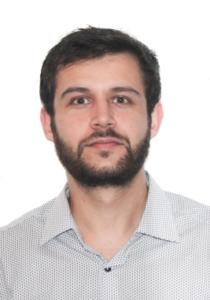 Graduado em Engenharia de Controle e Automação pela Universidade Federal de Santa Maria (2016) com graduação sanduíche em Electrical and Electronic Engineering na Newcastle University (UK). Tem experiência em sistemas de armazenamento de energia, principalmente baterias de íons de lítio (LV & HV), sistemas fotovoltaicos, eletrônica de potência, controle digital e sistemas embarcados. Atualmente trabalha como engenheiro de desenvolvimento de produto na PHB Eletrônica e é membro da comissão de estudos da ABNT CE-003:021.002- Baterias Estacionárias.
Graduado em Engenharia de Controle e Automação pela Universidade Federal de Santa Maria (2016) com graduação sanduíche em Electrical and Electronic Engineering na Newcastle University (UK). Tem experiência em sistemas de armazenamento de energia, principalmente baterias de íons de lítio (LV & HV), sistemas fotovoltaicos, eletrônica de potência, controle digital e sistemas embarcados. Atualmente trabalha como engenheiro de desenvolvimento de produto na PHB Eletrônica e é membro da comissão de estudos da ABNT CE-003:021.002- Baterias Estacionárias.
Tutorial 01 – Free Registration
Tutorial 02: Instrumentos aplicados a Eletrônica de Potência
Abstract: Ao longo dos últimos anos, é crescente a importância que tem sido dada a eficiência energética na indústria de um modo geral. Isso resulta na necessidade de um estudo cada vez mais aprofundado na eletrônica de potência aplicada a dispositivos tais como motores e inversores de frequência, de forma a se obter a melhor eficiência possível. Esta apresentação tem como objetivo mostrar a evolução de instrumentos utilizados para medição de potência e eficiência energética, aplicados a este mercado.
Speaker: Eric Bizarro – Yokogawa
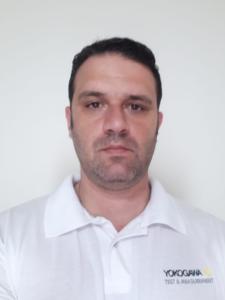 Eric Bizarro, Graduado em Engenharia Elétrica pela Escola de Engenharia Mauá em 2000 e MBA em Marketing pela Fundação Getúlio Vargas em 2013. Atuando pela Yokogawa América do Sul desde 2001, exerceu as funções de Engenheiro de Aplicação, Engenheiro de Vendas e Coordenador do Laboratório de Metrologia. Atualmente exerce a função de Supervisor de Vendas e Aplicações na divisão de Instrumentos de Teste e Medição da Yokogawa América do Sul.
Eric Bizarro, Graduado em Engenharia Elétrica pela Escola de Engenharia Mauá em 2000 e MBA em Marketing pela Fundação Getúlio Vargas em 2013. Atuando pela Yokogawa América do Sul desde 2001, exerceu as funções de Engenheiro de Aplicação, Engenheiro de Vendas e Coordenador do Laboratório de Metrologia. Atualmente exerce a função de Supervisor de Vendas e Aplicações na divisão de Instrumentos de Teste e Medição da Yokogawa América do Sul.
Tutorial 02 – Free Registratiom
Tutorial 03: Enabling the future distribution grid with new breed of simulation, design and test tools
Abstract: The power grid is evolving into a complex cyber-physical system. With high penetration of intermittent renewable generation, digitalization of control and communication system, growing availability of energy storage devices, and use of new technologies such as high voltage direct current (HVDC) transmission and solid-state transformers, it is becoming significantly more complex to design, test, validate, and deploy control systems for power grids. The widespread introduction of large numbers of highly dynamic power converters into the power grid, which are controllable and networked (e.g., solar inverters), brings in new requirements and new opportunities. In this talk we will provide an overview of current state of the art in simulation tools and algorithms, present the latest trends in high performance high-fidelity simulation needed for emerging cyber-physical power systems simulation and analysis. In addition, we will cover the fundamentals of low-latency ultra-high fidelity real time simulation technology from Typhoon HIL including both computational algorithms as well as computational architectures. We will present a range of industrial application examples developed with Typhoon HIL: from solar inverter controller testing all the way to terrestrial and shipboard microgrid systems.
Speaker: Murilo Almeida – Typhoon HIL
 MSc. Murilo Almeida is the head of Microgrid Applications Group at Typhoon HIL. Mainly, he is responsible for the microgrid applications branch. Coordinates the development team for high fidelity models and controls for elements of a microgrid, including protection relays, controlled and variable loads, energy management systems and distributed energy resources. Coordinates projects of microgrid testbed development by implementing the microgrids topology and interfaces in the simulation environment for the use of real controllers connected via hardware-in-the-loop. Responsible for the creation, development, implementation, upgrade and maintenance of the microgrid elements library for Typhoon HIL tool chain. He holds a degree in Electrical Engineering from Federal University of Goiás (2011), a master’s degree in Power Systems from Northeastern University (2016), and MBA in Business Management from FGV (2017).
MSc. Murilo Almeida is the head of Microgrid Applications Group at Typhoon HIL. Mainly, he is responsible for the microgrid applications branch. Coordinates the development team for high fidelity models and controls for elements of a microgrid, including protection relays, controlled and variable loads, energy management systems and distributed energy resources. Coordinates projects of microgrid testbed development by implementing the microgrids topology and interfaces in the simulation environment for the use of real controllers connected via hardware-in-the-loop. Responsible for the creation, development, implementation, upgrade and maintenance of the microgrid elements library for Typhoon HIL tool chain. He holds a degree in Electrical Engineering from Federal University of Goiás (2011), a master’s degree in Power Systems from Northeastern University (2016), and MBA in Business Management from FGV (2017).
Tutorial 03 – Free Registration
Plenary Session 1: Socially relevant science and technology: how the Portuguese experience can inspire renewal in Brazil
Abstract: The understanding that science and technology must be socially relevant is a requirement for the cultural transformation of the University, in a country that wants to ascend the scale of development. The social relevance of the knowledge generated in the University is fully achieved only if such knowledge is translated into value in the economy, through its transfer to companies and public administration. It is a profound misconception to believe that the problem of the scarcity of technology transfer is solvable with money, only. Disruptive policies and management are needed. Portugal is a good case study. The way in which it has effected, in forty years, the transition from underdevelopment to full industrialization allows us to draw valuable lessons. INESC TEC is one of the most evident materializations of this reality. Having pioneered with its model (which came to be widely replicated and adopted as a national policy), it continues to emerge as a forum for intense debate and reflection on the instruments of modernization of the economy. The science produced in the university environment is converted to value by metamorphosing academic management into a more entrepreneurial sense. This is achieved through creating a culture of meritocracy and evaluation with incentives and not with punishment, installing a knowledge-to-value production chain, allowing new organization models in the university and building an interface ecosystem, redesigning forms of relationship with industry, creating new start- ups and establishing strategic university-business alliances. The keynote describes some of the principles of thinking and organization of INESC TEC and the policies followed in Portugal, and proposes reflections on how Brazil can extract lessons and inspiration for its well needed evolution process.
Speaker: Prof. Vladimiro Miranda
President of INESC P&D Brasil, São Paulo, Brazil / INESC TEC – INESC Technology and Science, Portugal
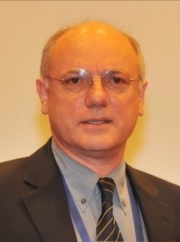 Dr Vladimiro Miranda is Full Professor (Catedrático) of the University of Porto and researcher at INESC TEC, Portugal. He is an IEEE Fellow (USA) since 2006 and recipient of the IEEE PES Renewable Energy Excellence Award 2014. He is author or co-author of many scientific publications in the most relevant journals in Power Systems. He has won several scientific awards, including an IEEE Excellence Award in renewable energies, and his innovative solutions have been incorporated in industrial products in use in several continents. He was a member of the Board of Directors of INESC TEC, Portugal, for 18 years, and is presently the President of INESC P&D, Brasil. Prof. Miranda is also member of the Doctoral Council of UTAD (University of Trás os Montes e Alto Douro), Portugal and an International Scientific Advisor for: IRESEN, Ministry of Energy, Government of Morocco; Hong Kong Polytechnic University, China; Instituto de Investigación Tecnológica (Madrid), Spain; Instituto de Energía Eléctrica (San Juan), Argentina; Laboratory for Biologic and Chemical Defense of the Portuguese Army. He was invited as Honorary Professor of the Novi Sad University, Serbia, and was President of INESC Macau, China. Besides responsible for many international projects, he has served in the Board of start-up companies generated by INESC TEC.
Dr Vladimiro Miranda is Full Professor (Catedrático) of the University of Porto and researcher at INESC TEC, Portugal. He is an IEEE Fellow (USA) since 2006 and recipient of the IEEE PES Renewable Energy Excellence Award 2014. He is author or co-author of many scientific publications in the most relevant journals in Power Systems. He has won several scientific awards, including an IEEE Excellence Award in renewable energies, and his innovative solutions have been incorporated in industrial products in use in several continents. He was a member of the Board of Directors of INESC TEC, Portugal, for 18 years, and is presently the President of INESC P&D, Brasil. Prof. Miranda is also member of the Doctoral Council of UTAD (University of Trás os Montes e Alto Douro), Portugal and an International Scientific Advisor for: IRESEN, Ministry of Energy, Government of Morocco; Hong Kong Polytechnic University, China; Instituto de Investigación Tecnológica (Madrid), Spain; Instituto de Energía Eléctrica (San Juan), Argentina; Laboratory for Biologic and Chemical Defense of the Portuguese Army. He was invited as Honorary Professor of the Novi Sad University, Serbia, and was President of INESC Macau, China. Besides responsible for many international projects, he has served in the Board of start-up companies generated by INESC TEC.
Plenary Session 2: Dual DC nanogrid with interlink converter
Abstract: The concept of nanogrids is suitable for application in net-zero energy homes. These should produce as much energy, ideally from renewables, as they consume. Ideally, they should be grid connected while capable of operating autonomously. Thus, appropriate means for energy storage and management are essential. In this talk, the conventional AC nanogrid is briefly discussed and then DC nanogrids are introduced. The basic characteristics of single-bus DC nanogrids are presented including power electronic interfaces controlled in a decentralized way with a hierarchical structure based on DC bus signaling (DBS). The alternative of a Dual DC bus system with power sources and storage units are employed in both buses is discussed. Bi-directional power flow between buses is achieved by means of an interlink converter. The concept of a protection system based on the coordination of power electronic interfaces and contactors suitable for DC nanogrids is introduced.
Speaker: Prof. Luiz Lopes
Concordia University, Canada
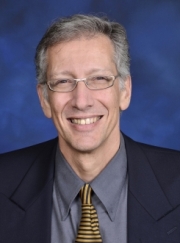 Luiz Lopes obtained his M.A.Sc. degree from UFSC (Brazil) in 1989 and the PhD degree from McGill University (Canada) in 1996. From 1996 to 2001 he was an Associate Professor with UFPA (Brazil). He joined the department of Electrical and Computer Engineering of Concordia University (Canada) in 2002, where he is a Professor. He has been an invited professor at EPFL (Switzerland), Université de Toulouse (France), SUPELEC (France) and UTBM (France). His expertise includes power electronics, renewable energy systems and distributed power generation. He has published more than 140 papers in refereed journals and conference proceedings and trained more than 40 graduate students. His research has been supported by NSERC (Discovery Grant, CRD, Engage), government agencies/laboratories (CanmetENERGY) and industry partners (ALCOA, Geodata, Bombardier, TM4, OPAL-RT, THALES). Dr. Lopes was a technical representative for Canada in Task 11 “PV Hybrid Systems within Mini-grids” of IEA-PVPS and leader of Activity 21 on mini-grid stability. He is a member of the international advisory board of Efficacity, French urban energy transition Institute. Dr. Lopes is a senior member of the IEEE and a member of the Ordre des Ingénieurs du Québec.
Luiz Lopes obtained his M.A.Sc. degree from UFSC (Brazil) in 1989 and the PhD degree from McGill University (Canada) in 1996. From 1996 to 2001 he was an Associate Professor with UFPA (Brazil). He joined the department of Electrical and Computer Engineering of Concordia University (Canada) in 2002, where he is a Professor. He has been an invited professor at EPFL (Switzerland), Université de Toulouse (France), SUPELEC (France) and UTBM (France). His expertise includes power electronics, renewable energy systems and distributed power generation. He has published more than 140 papers in refereed journals and conference proceedings and trained more than 40 graduate students. His research has been supported by NSERC (Discovery Grant, CRD, Engage), government agencies/laboratories (CanmetENERGY) and industry partners (ALCOA, Geodata, Bombardier, TM4, OPAL-RT, THALES). Dr. Lopes was a technical representative for Canada in Task 11 “PV Hybrid Systems within Mini-grids” of IEA-PVPS and leader of Activity 21 on mini-grid stability. He is a member of the international advisory board of Efficacity, French urban energy transition Institute. Dr. Lopes is a senior member of the IEEE and a member of the Ordre des Ingénieurs du Québec.
Plenary Session 3: Wireless Power Transfer Technologies for an Unplugged World
Abstract: It has been nearly 100 years since the first experiments on Wireless Power Transfer (WPT) were conducted by Nikola Tesla. Nowadays, WPT is attracting a great attention owing to its many benefits, as easiness of connection/disconnection, safety, endurance and low maintenance. Thus, WPT is currently being used in applications as wireless charging for mobile phones and electric vehicles, powering of smart sensors, rotating devices, etc. In fact, WPT has arisen as the only suitable solution in many cutting-edge medical, aerospace and robotic applications. In this talk, the different WPT technologies will be introduced and reviewed, highlighting their benefits and main applications. The talk will then be focused on WPT based on a loosely coupled transformer, also known as inductive power transfer (IPT). The different components of an IPT system will be presented in detail, as well as converter design and applications.
Prof. Jose Marcos Alonso
University of Oviedo, Spain
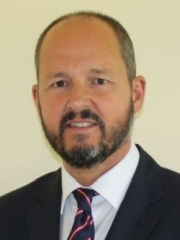 (IEEE S’94, M’98, SM’03). He received the M. Sc. Degree and Ph. D. both in electrical engineering, from the University of Oviedo, Spain, in 1990 and 1994 respectively. Since 2007, he is a Professor at the Electrical Engineering Department of the University of Oviedo, in Asturias, Spain. Prof. Alonso is co-author of more than 400 journal and conference publications, including 100 publications in highly referenced journals. His research interests include electronic ballasts, LED power supplies, power factor correction, dc-dc converters, soft-switching converters, power factor correction, EMI, resonant inverters, renewable energy applications and high-frequency switching converters in general. He has been advisor/co-advisor of 9 Ph.D. Thesis and he is the holder of 7 Spanish patents. He has participated in more than 50 research projects and contracts with companies. He has been a visiting researcher at the Federal University of Santa Maria, Santa Maria, Brazil, in 2011 and 2014, and at the Center for Power Electronics Systems, Virginia Tech., Blacksburg, USA, in 2013. Prof. Alonso has been awarded with the Early Career Award of the IEEE Industrial Electronics Society in 2006. He was honored with the University of Oviedo Electrical Engineering Doctorate Award. Prof. Alonso was also awarded with the National Funding for Intensification of Research Activity for the period 2008-2012. He also holds 8 IEEE paper awards. He serves as an Associate Editor of the IEEE Transactions on Power Electronics and IEEE Journal of Emerging and Selected Topics on Power Electronics. He has been Guest/Co-Guest Editor of 3 special issues in lighting applications published in IEEE Transactions on Power Electronics (2007).
(IEEE S’94, M’98, SM’03). He received the M. Sc. Degree and Ph. D. both in electrical engineering, from the University of Oviedo, Spain, in 1990 and 1994 respectively. Since 2007, he is a Professor at the Electrical Engineering Department of the University of Oviedo, in Asturias, Spain. Prof. Alonso is co-author of more than 400 journal and conference publications, including 100 publications in highly referenced journals. His research interests include electronic ballasts, LED power supplies, power factor correction, dc-dc converters, soft-switching converters, power factor correction, EMI, resonant inverters, renewable energy applications and high-frequency switching converters in general. He has been advisor/co-advisor of 9 Ph.D. Thesis and he is the holder of 7 Spanish patents. He has participated in more than 50 research projects and contracts with companies. He has been a visiting researcher at the Federal University of Santa Maria, Santa Maria, Brazil, in 2011 and 2014, and at the Center for Power Electronics Systems, Virginia Tech., Blacksburg, USA, in 2013. Prof. Alonso has been awarded with the Early Career Award of the IEEE Industrial Electronics Society in 2006. He was honored with the University of Oviedo Electrical Engineering Doctorate Award. Prof. Alonso was also awarded with the National Funding for Intensification of Research Activity for the period 2008-2012. He also holds 8 IEEE paper awards. He serves as an Associate Editor of the IEEE Transactions on Power Electronics and IEEE Journal of Emerging and Selected Topics on Power Electronics. He has been Guest/Co-Guest Editor of 3 special issues in lighting applications published in IEEE Transactions on Power Electronics (2007).
Plenary Session 4: Light beyond Lighting, frontiers in Lighting Technologies: The human-centric intelligent lighting challenge
Abstract: Since the human race emerged it has been known that fire and heated objects emit light that can be used for lighting purposes; artificial lighting has been discovered. Since of 19th-century end, artificial lighting has been the subject of a continuous and fascinating evolution; 20th century scientists and development engineers worldwide created such a wide range of lighting solutions for every lighting application. Today, the importance and application of these “legacy” lighting technologies is decreasing. During the last decade, Solid-State Lighting (LEDs, O-LEDs, solid-state lasers) challenges conventional technologies. In particular, LED has turned into a game changer beating the conventional technologies in all aspects. It is therefore anticipated that in short term, all of electric lighting will be based on SSLs. Should SSL revolution proceed to the projected conclusion, replacing all legacy technologies, there will be a further major change in the lighting market. Artificial light production absorbs 15% of the world’s electricity annual production. Therefore, past century’s research and development focused on single energy efficacy enhancement. Consequently, we knowingly were not serving society as effectively as we could. Industry has coined a new term “human-centric lighting” to draw renewed attention to its primary effort to be successful in meeting society’s needs. Furthermore, we are witnessing a transition from the conventional “analogue” lighting technologies to “digital” lighting. Intelligent lighting will become the backbone for smart homes and smart cities. This way, lighting will become the heart of the “Internet of Things”.
Prof. Georges Zissis
University of Toulouse 3 – LAPLACE, France
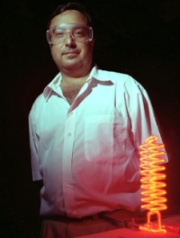 Dr. Georges Zissis is a senior member of IEEE, full professor in the Electrical Engineering Department of Toulouse 3 University, France, and President-elect of IEEE Industry Applications Society (2017-2018). He won several scientific awards and has published 5 books, 25 book chapters, 2 patents and more than 170 journal papers. He is also Director of the research group “Light and Matter” of the Laboratory of Plasma and Conversion of Energy (LAPLACE), President of the 63rd section (Power Electronics, Electronics, Optoelectronics and Systems) of the French National Council of Universities (2015-19) and Professor Honoris Causa of Saint Petersburg University, Russian Federation (Physics department), 2011. His research interests include Physics of electrical discharges used as light sources; impact of lighting to energy, environment, quality of life, health and security; Power electronics and Energy; among others.
Dr. Georges Zissis is a senior member of IEEE, full professor in the Electrical Engineering Department of Toulouse 3 University, France, and President-elect of IEEE Industry Applications Society (2017-2018). He won several scientific awards and has published 5 books, 25 book chapters, 2 patents and more than 170 journal papers. He is also Director of the research group “Light and Matter” of the Laboratory of Plasma and Conversion of Energy (LAPLACE), President of the 63rd section (Power Electronics, Electronics, Optoelectronics and Systems) of the French National Council of Universities (2015-19) and Professor Honoris Causa of Saint Petersburg University, Russian Federation (Physics department), 2011. His research interests include Physics of electrical discharges used as light sources; impact of lighting to energy, environment, quality of life, health and security; Power electronics and Energy; among others.
Special Session 01: Importância da interação entre academia e indústria na visão das agências de fomento e sociedades científicas
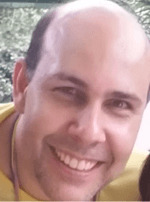 Prof. Marcelo Cabral Cavalcanti
Prof. Marcelo Cabral Cavalcanti
Universidade Federal de Pernambuco – UFPE
Presidente da Sociedade Brasileira de Eletrônica de Potência (SOBRAEP)
Nasceu em Recife em 1972. Recebeu o grau de Engenheiro Eletricista em 1997 pela Universidade Federal de Pernambuco (UFPE) e os graus de Mestre e Doutor em Engenharia Elétrica pela Universidade Federal de Campina Grande (UFCG) em 1999 e 2003, respectivamente. Fez Doutorado-sanduíche no Center for Power Electronics Systems, Virginia Tech, USA entre outubro de 2001 e agosto de 2002. Desde 2005, é Professor do Departamento de Engenharia Elétrica na UFPE, onde hoje é professor associado. Recebeu The Best Paper Award em duas conferências organizadas pelo IEEE: International Conference on Power Electronics and Intelligent Control for Energy Conservation, 2005 e International Symposium on Industrial Electronics, 2011. Fez Pós-Doutorado na Universidad de Alcalá, Espanha entre setembro de 2012 e agosto de 2013. Foi Vice-Presidente da Associação Brasileira de Eletrônica de Potência (SOBRAEP) e Editor da Revista Eletrônica de Potência durante o biênio 2016-2017. É Presidente da SOBRAEP desde dezembro de 2017. Atua como Coordenador do Programa de Pós-Graduação em Engenharia Elétrica da UFPE (conceito 5 CAPES) desde março de 2016. Tem atuado na área de eletrônica de potência, principalmente nos seguintes temas: qualidade da energia elétrica e sistemas fotovoltaicos.
Prof. Odir Dellagostin
 Universidade Federal de Pelotas
Universidade Federal de Pelotas
Diretor-presidente da FAPERGS
Odir Dellagostin é formado em Medicina Veterinária pela UFPel (1989), tem doutorado em Biologia Molecular pela University of Surrey – Inglaterra (1995) e pós-doutorado pela mesma Universidade (1997). É professor da UFPel desde 1997 e pesquisador nível 1A do CNPq desde 2007. Tem experiência na área de Biologia Molecular, atuando principalmente no desenvolvimento de vacinas recombinantes, especialmente contra leptospirose. Já publicou mais de 200 artigos científicos e realizou o depósito de 28 patentes. Orientou mais de 45 teses e dissertações pelos programas de pós-graduação em Biotecnologia e em Veterinária. Foi coordenador do Centro de Biotecnologia, Pró-Reitor de Pesquisa e Pós-Graduação da UFPel e Diretor do Centro de Desenvolvimento Tecnológico também da UFPel. Foi membro da Comissão Técnica Nacional de Biossegurança do MCTIC, coordenador do Comitê Assessor de Ciências Biológicas da FAPERGS e membro do Comitê Assessor de Veterinária do CNPq. Foi Coordenador da área de Biotecnologia da CAPES de 2014 a março de 2018. Atualmente é Diretor Presidente da FAPERGS.
 Prof. Osvaldo Saavedra
Prof. Osvaldo Saavedra
Universidade Federal do Maranhão – UFMA
Diretor-presidente da Sociedade Brasileira de Automática (SBA)
Osvaldo Ronald Saavedra Mendez concluiu o doutorado em Engenharia Elétrica pela Universidade Estadual de Campinas em 1993. Atualmente é professor titular da Universidade Federal do Maranhão. É co-fundador do programa de Pós-Graduação de Engenharia de Eletricidade da UFMA, fundador do Núcleo de Energias Alternativas da UFMA, Coordenou a fundação do Instituto de Energia Elétrica na UFMA. Coordenou e/ou participou em mais de 20 projetos de pesquisa e de desenvolvimento, de colaboração nacional e internacional, e de pesquisa aplicada. Foi presidente do VII SBAI /IEEE-LARS, coordenador local SBRN 2004, coordenador local do 2004 IEEE MLSP e membro freqüente de comitês de congressos nacionais e internacionais. Foi Coordenador da Região nordeste da Sociedade Brasileira de Automática (SBA) e membro do Conselho Superior dessa Sociedade por dois períodos. Foi diretor vice-presidente da SBA pelo biênio 2010-2012 e membro da Comissão de Avaliação Trienal de Área – Engenharias IV- CAPES nos anos 2010 e 2013. É membro do comitê editorial de várias revistas, revisor de vários periódicos, membro da SBA e IEEE. Seus interesses abrangem operação de sistemas modernos de energia elétrica, microrredes e energias renováveis. De 2011 a 2014 foi Secretário Adjunto de Ciência e Tecnologia do Estado do Maranhão. Atualmente é diretor-presidente da SBA pelo biênio 2017-2018, membro do CA-EE do CNPq (2016-2018) e coordenador do Instituto Nacional de Ciência e Tecnologia em Energias Oceânicas e Fluviais – INEOF.
Special Session 02: Experiência de pesquisadores na área de geração e qualidade de energia
Tema: Monitoração da qualidade de energia utilizando estimação de estados e medição fasorial sincronizada
 Prof. José Luiz Rezende Pereira
Prof. José Luiz Rezende Pereira
Universidade Federal de Juiz de Fora – UFJF
Coordenador do INCT de Energia Elétrica – INERGE
Possui graduação em Engenharia Elétrica pela Universidade Federal de Juiz de Fora (1975), mestrado em Engenharia Elétrica pela Universidade Federal do Rio de Janeiro (1978) e Ph.D. em Engenharia Elétrica – University of Manchester (1988). Atualmente é pesquisador 1B do Conselho Nacional de Desenvolvimento Científico e Tecnológico e professor titular da Universidade Federal de Juiz de Fora, onde atuou como Vice-Reitor (2006-2014). Tem experiência na área de Engenharia Elétrica, com ênfase em Sistemas de energia Elétrica, atuando em desenvolvimento de métodos numéricos aplicados à análise de sistemas de transmissão e distribuição de energia elétrica, com foco principal na área de redes elétricas inteligentes. Coordena o INCT de Energia Elétrica – INERGE desde 2008.
Tema: Energias oceânicas
 Prof. Osvaldo Saavedra
Prof. Osvaldo Saavedra
Universidade Federal do Maranhão – UFMA
Diretor-presidente da Sociedade Brasileira de Automática (SBA)
Osvaldo Ronald Saavedra Mendez concluiu o doutorado em Engenharia Elétrica pela Universidade Estadual de Campinas em 1993. Atualmente é professor titular da Universidade Federal do Maranhão. É co-fundador do programa de Pós-Graduação de Engenharia de Eletricidade da UFMA, fundador do Núcleo de Energias Alternativas da UFMA, Coordenou a fundação do Instituto de Energia Elétrica na UFMA. Coordenou e/ou participou em mais de 20 projetos de pesquisa e de desenvolvimento, de colaboração nacional e internacional, e de pesquisa aplicada. Foi presidente do VII SBAI /IEEE-LARS, coordenador local SBRN 2004, coordenador local do 2004 IEEE MLSP e membro freqüente de comitês de congressos nacionais e internacionais. Foi Coordenador da Região nordeste da Sociedade Brasileira de Automática (SBA) e membro do Conselho Superior dessa Sociedade por dois períodos. Foi diretor vice-presidente da SBA pelo biênio 2010-2012 e membro da Comissão de Avaliação Trienal de Área – Engenharias IV- CAPES nos anos 2010 e 2013. É membro do comitê editorial de várias revistas, revisor de vários periódicos, membro da SBA e IEEE. Seus interesses abrangem operação de sistemas modernos de energia elétrica, microrredes e energias renováveis. De 2011 a 2014 foi Secretário Adjunto de Ciência e Tecnologia do Estado do Maranhão. Atualmente é diretor-presidente da SBA pelo biênio 2017-2018, membro do CA-EE do CNPq (2016-2018) e coordenador do Instituto Nacional de Ciência e Tecnologia em Energias Oceânicas e Fluviais – INEOF.
Tema: Resolvendo problemas complexos usando ESPO
 Prof. Vladimiro Miranda
Prof. Vladimiro Miranda
INESC Technology and Science, Portugal
President of INESC P&D Brasil, São Paulo, Brazil
Technology and Science, Portugal President of INESC P&D Brasil, São Paulo, Brazil Dr Vladimiro Miranda is Full Professor (Catedrático) of the University of Porto and researcher at INESC TEC, Portugal. He is an IEEE Fellow (USA) since 2006 and recipient of the IEEE PES Renewable Energy Excellence Award 2014. He is author or co-author of many scientific publications in the most relevant journals in Power Systems. He has won several scientific awards, including an IEEE Excellence Award in renewable energies, and his innovative solutions have been incorporated in industrial products in use in several continents. He was a member of the Board of Directors of INESC TEC, Portugal, for 18 years, and is presently the President of INESC P&D, Brasil. Prof. Miranda is also member of the Doctoral Council of UTAD (University of Trás os Montes e Alto Douro), Portugal and an International Scientific Advisor for: IRESEN, Ministry of Energy, Government of Morocco; Hong Kong Polytechnic University, China; Instituto de Investigación Tecnológica (Madrid), Spain; Instituto de Energía Eléctrica (San Juan), Argentina; Laboratory for Biologic and Chemical Defense of the Portuguese Army. He was invited as Honorary Professor of the Novi Sad University, Serbia, and was President of INESC Macau, China. Besides responsible for many international projects, he has served in the Board of start-up companies generated by INESC TEC.
Special Session 03: Experiência de pesquisadores na área de processamento de energia
Tema: Técnica de Seguimento do Ponto de Máxima Potência em Sistemas Fotovoltaicos
 Prof. Marcelo Cabral Cavalcanti
Prof. Marcelo Cabral Cavalcanti
Universidade Federal de Pernambuco – UFPE
Presidente da Sociedade Brasileira de Eletrônica de Potência (SOBRAEP)
Nasceu em Recife em 1972. Recebeu o grau de Engenheiro Eletricista em 1997 pela Universidade Federal de Pernambuco (UFPE) e os graus de Mestre e Doutor em Engenharia Elétrica pela Universidade Federal de Campina Grande (UFCG) em 1999 e 2003, respectivamente. Fez Doutorado-sanduíche no Center for Power Electronics Systems, Virginia Tech, USA entre outubro de 2001 e agosto de 2002. Desde 2005, é Professor do Departamento de Engenharia Elétrica na UFPE, onde hoje é professor associado. Recebeu The Best Paper Award em duas conferências organizadas pelo IEEE: International Conference on Power Electronics and Intelligent Control for Energy Conservation, 2005 e International Symposium on Industrial Electronics, 2011. Fez Pós-Doutorado na Universidad de Alcalá, Espanha entre setembro de 2012 e agosto de 2013. Foi Vice-Presidente da Associação Brasileira de Eletrônica de Potência (SOBRAEP) e Editor da Revista Eletrônica de Potência durante o biênio 2016-2017. É Presidente da SOBRAEP desde dezembro de 2017. Atua como Coordenador do Programa de Pós-Graduação em Engenharia Elétrica da UFPE (conceito 5 CAPES) desde março de 2016. Tem atuado na área de eletrônica de potência, principalmente nos seguintes temas: qualidade da energia elétrica e sistemas fotovoltaicos.
Tema: Virtual Impedance Approach for Power Flow Control
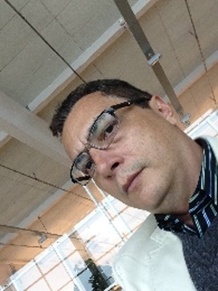 Prof. Ricardo Lucio de Araujo Ribeiro
Prof. Ricardo Lucio de Araujo Ribeiro
Universidade Federal do Rio Grande do Norte – UFRN
Possui graduação em Engenharia Elétrica pela Universidade Federal da Paraíba (1990), mestrado em Engenharia Elétrica pela Universidade Federal da Paraíba (1992) e doutorado em Engenharia Elétrica pela Universidade Federal da Paraíba (2003). Atualmente é Professor Adjunto I da Universidade Federal do Rio Grande do Norte. Tem experiência na área de Engenharia Elétrica, com ênfase em Eletrônica Industrial, Sistemas e Controles Eletrônicos. Atuando principalmente nos seguintes temas: Tolerância a Falhas, Controle de Máquinas.
Tema: Proposta de geometrias de núcleos usados em acoplamentos de sistemas através do fluxo magnético
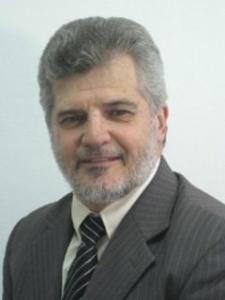 Prof. Denizar C. Martins
Prof. Denizar C. Martins
Universidade Federal de Santa Catarina – UFSC
Nascido em São Paulo, SP, em abril de 1955. Possui graduação em Licenciatura com ênfase em Eletricidade (1978), graduação em Engenharia Elétrica (1978), mestrado em Engenharia Elétrica (1981), todos pela Universidade Federal de Santa Catarina (UFSC) e doutorado em Engenharia Elétrica pelo Institut National Polytechnique de Toulouse, França (1986). Galgou todos os níveis da carreira de magistério por concurso público, chegando a Professor Titular em janeiro de 1993. Atualmente é Supervisor do INEP (Instituto de Eletrônica de Potência), e professor do Departamento de Engenharia Elétrica da Universidade Federal de Santa Catarina, onde leciona disciplinas de graduação e pós-graduação. Foi Chefe do Departamento de Engenharia Elétrica da UFSC por dois mandatos entre abril de 2007 a abril de 2011. Foi Coordenador do Programa de Pós-Graduação em Engenharia Elétrica do Centro Tecnológico da UFSC. Sócio Fundador da SOBRAEP (Sociedade Brasileira de Eletrônica de Potência). Foi Presidente da SOBRAEP (Sociedade Brasileira de Eletrônica de Potência). Já desenvolveu vários projetos tecnológicos em parceria com Empresas Nacionais. É membro das Sociedades: SOBRAEP, SBA e IEEE. É credenciado pelo Programa de Pós-Graduação em Engenharia Elétrica da UFSC para orientar alunos em dissertação de mestrado e em tese de doutorado. Tem experiência na área de Engenharia Elétrica, com ênfase em Eletrônica de Potência, atuando principalmente nos seguintes temas: conversores estáticos CC-CC e CC-CA, correção de fator de potência, qualidade de energia, processamento eletrônico da energia elétrica, redes ativas de distribuição, sistemas de geração distribuída, microrredes CC e CA, simulação de conversores estáticos e acionamentos elétricos. Possui em torno de 300 artigos científicos publicados. Publicou quatro livros nacionais na área de Eletrônica de Potência e dois capítulos de livros internacionais na área de processamento eletrônico da energia solar fotovoltaica. É Senior Member do IEEE.
Panel Discussion 01: Academia and Industry: Entrepreneurship Experiences on Energy processing and Generation
 Mediador: Prof. Humberto Pinheiro
Mediador: Prof. Humberto Pinheiro
Universidade Federal de Santa Maria
Grupo de Eletrônica de Potência e Controle – GEPOC
Possui graduação em Engenharia Elétrica pela Universidade Federal de Santa Maria (1983), mestrado em Engenharia Elétrica pela Universidade Federal de Santa Catarina (1987) e doutorado em Electrical and Computer Engineering – Concordia University (1998). Atualmente é professor associado da Universidade Federal de Santa Maria. Tem experiência na área de Engenharia Elétrica, com ênfase em Eletrônica Industrial, atuando principalmente nos seguintes temas: controle discreto de conversores estáticos, sistemas de geração eólica, modulação para conversores estáticos é membro da IEEE Transactions on Industrial Electronics.
 Dr. Renan Diego de Oliveira Reiter
Dr. Renan Diego de Oliveira Reiter
Director of Sonnen Energia
Possui graduação em Engenharia Elétrica pela Fundação Universidade Regional de Blumenau (2009), mestrado em Engenharia Elétrica pela Universidade Regional de Blumenau (2012), e doutorado em Engenharia Elétrica pela Universidade Federal de Santa Maria (2016). Seus principais temas de interesse em pesquisa são: Controle digital aplicado, sistemas fotovoltaicos. É membro da Associação Brasileira de Eletrônica de Potência (SOBRAEP), da Power Electronics Society (PELS) e da Industrial Electronics Society (IES).
 Msc. Murilo Almeida
Msc. Murilo Almeida
Microgrid Applications Group – Typhoon HIL
MSc. Murilo Almeida is the head of Microgrid Applications Group at Typhoon HIL. Mainly, he is responsible for the microgrid applications branch. Coordinates the development team for high fidelity models and controls for elements of a microgrid, including protection relays, controlled and variable loads, energy management systems and distributed energy resources. Coordinates projects of microgrid testbed development by implementing the microgrids topology and interfaces in the simulation environment for the use of real controllers connected via hardware-in-the-loop. Responsible for the creation, development, implementation, upgrade and maintenance of the microgrid elements library for Typhoon HIL tool chain. He holds a degree in Electrical Engineering from Federal University of Goiás (2011), a master’s degree in Power Systems from Northeastern University (2016), and MBA in Business Management from FGV (2017).
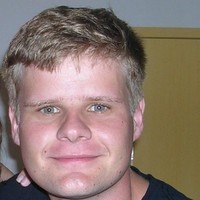 Msc. Igor Weide Jaskulski
Msc. Igor Weide Jaskulski
R&D Renewable Energy Converters – WEG
Possui graduação e mestrado em Engenharia Elétrica pela Universidade Federal de Santa Maria em 2004 e 2007. Trabalhou para a Enercon e Siemens na Alemanha e Inglaterra entre 2007 até 2012 como engenheiro de desenvolvimento. Desde 2012 está trabalhando na WEG Automação, no setor de desenvolvimento de drives engenheirados, onde é responsável pelo desenvolvimento dos conversores de frequência usados nos aerogeradores WEG. Seus principais interesses são eletrônica de potência aplicada a conversores de energias renováveis e aspectos da conexão desses conversores à rede elétrica.
Panel Discussion 02: O Papel dos Institutos Nacionais de C&T no Fomento à P&D e Inovação no Brasil: Oportunidades para a universidade e a indústria.
 Prof. Leandro Michels – Mediador
Prof. Leandro Michels – Mediador
Universidade Federal de Santa Maria
INCT em Geração Distribuída
Leandro Michels received the B.S and Ph.D. degrees from the Federal University of Santa Maria, Brazil, in 2002 and 2006, respectively, both in electrical engineering. Since 2009 he has been with the Power Electronics and Control Research Group (GEPOC) at Federal University of Santa Maria, where he is currently an Associate Professor. He published more than 100 papers in scientific journals and conferences, have 3 patent applications, and supervised 3 Ph.D dissertations and 8 master theses. He has works in the field of photovoltaic systems as manager of the laboratory of PV inverters tests (LabEnsaios INRI), in working groups to develop Brazilian photovoltaic standards, as well as in R&D projects with industry. Dr. Michels is fellow level DT-1D of CNPq (Technological Development and Innovative Extension) and Senior Member of IEEE.
 Prof. José Luiz Rezende Pereira
Prof. José Luiz Rezende Pereira
Universidade Federal de Juiz de Fora – UFJF
Coordenador do INCT de Energia Elétrica – INERGE
Possui graduação em Engenharia Elétrica pela Universidade Federal de Juiz de Fora (1975), mestrado em Engenharia Elétrica pela Universidade Federal do Rio de Janeiro (1978) e Ph.D. em Engenharia Elétrica – University of Manchester (1988). Atualmente é pesquisador 1B do Conselho Nacional de Desenvolvimento Científico e Tecnológico e professor titular da Universidade Federal de Juiz de Fora, onde atuou como Vice-Reitor (2006-2014). Tem experiência na área de Engenharia Elétrica, com ênfase em Sistemas de energia Elétrica, atuando em desenvolvimento de métodos numéricos aplicados à análise de sistemas de transmissão e distribuição de energia elétrica, com foco principal na área de redes elétricas inteligentes. Coordena o INCT de Energia Elétrica – INERGE desde 2008.
 Prof. Luis Antônio Aguirre
Prof. Luis Antônio Aguirre
Universidade Federal de Minas Gerais – UFMG
Possui graduação (1987) e mestrado (1990) em Engenharia Elétrica pela Universidade Federal de Minas Gerais e doutorado – University of Sheffield (1994) em Engenharia de Controle. Atualmente é professor titular do Departamento de Engenharia Eletrônica da Universidade Federal de Minas Gerais e bolsista 1A do CNPq. Tem experiência na área de modelagem matemática e identificação de sistemas, atuando principalmente nos seguintes temas: identificação de sistemas não-lineares, identificação de sistemas, sistemas dinâmicos não-lineares, caos e análise e predição de séries temporais. Atualmente é o Editor Regional do International Journal of Modeling, Identification and Control, e Editor Associado do Journal of Control, Automation and Electrical Systems. É autor dos livros: Introdução à Identificação de Sistemas, Editora UFMG, 4a Edição (20015) e Fundamentos de Instrumentação, Pearson do Brasil (2013). Serviu como Editor Chefe da Revista Controle & Automação (2009 a 2012) e da Enciclopédia de Automática: Controle & Automação, Editora Edgar Blücher (2007). Foi vice-presidente da Sociedade Brasileira de Automática por um mandato e membro do seu Conselho Superior por três. Foi Diretor Científico do XX-CBA (2014). Foi membro do Comitê Assessor EE do CNPq (2000-2001 e a partir de 2016) e da comissão da CAPES para avaliação de programas de pós-graduação da área de Engenharias IV. Foi coordenador adjunto da área de Engenharias IV na CAPES de 2008 a junho de 2014. É membro da Câmara de Tecnologia da FAPEMIG desde março de 2016, a qual coordena desde março de 2017.
 Prof. Marcelo Cabral Cavalcanti
Prof. Marcelo Cabral Cavalcanti
Universidade Federal de Pernambuco – UFPE
Presidente da Sociedade Brasileira de Eletrônica de Potência (SOBRAEP)
Nasceu em Recife em 1972. Recebeu o grau de Engenheiro Eletricista em 1997 pela Universidade Federal de Pernambuco (UFPE) e os graus de Mestre e Doutor em Engenharia Elétrica pela Universidade Federal de Campina Grande (UFCG) em 1999 e 2003, respectivamente. Fez Doutorado-sanduíche no Center for Power Electronics Systems, Virginia Tech, USA entre outubro de 2001 e agosto de 2002. Desde 2005, é Professor do Departamento de Engenharia Elétrica na UFPE, onde hoje é professor associado. Recebeu The Best Paper Award em duas conferências organizadas pelo IEEE: International Conference on Power Electronics and Intelligent Control for Energy Conservation, 2005 e International Symposium on Industrial Electronics, 2011. Fez Pós-Doutorado na Universidad de Alcalá, Espanha entre setembro de 2012 e agosto de 2013. Foi Vice-Presidente da Associação Brasileira de Eletrônica de Potência (SOBRAEP) e Editor da Revista Eletrônica de Potência durante o biênio 2016-2017. É Presidente da SOBRAEP desde dezembro de 2017. Atua como Coordenador do Programa de Pós-Graduação em Engenharia Elétrica da UFPE (conceito 5 CAPES) desde março de 2016. Tem atuado na área de eletrônica de potência, principalmente nos seguintes temas: qualidade da energia elétrica e sistemas fotovoltaicos.
 Prof. Odir Dellagostin
Prof. Odir Dellagostin
Universidade Federal de Pelotas
Diretor-presidente da FAPERGS
Odir Dellagostin é formado em Medicina Veterinária pela UFPel (1989), tem doutorado em Biologia Molecular pela University of Surrey – Inglaterra (1995) e pós-doutorado pela mesma Universidade (1997). É professor da UFPel desde 1997 e pesquisador nível 1A do CNPq desde 2007. Tem experiência na área de Biologia Molecular, atuando principalmente no desenvolvimento de vacinas recombinantes, especialmente contra leptospirose. Já publicou mais de 200 artigos científicos e realizou o depósito de 28 patentes. Orientou mais de 45 teses e dissertações pelos programas de pós-graduação em Biotecnologia e em Veterinária. Foi coordenador do Centro de Biotecnologia, Pró-Reitor de Pesquisa e Pós-Graduação da UFPel e Diretor do Centro de Desenvolvimento Tecnológico também da UFPel. Foi membro da Comissão Técnica Nacional de Biossegurança do MCTIC, coordenador do Comitê Assessor de Ciências Biológicas da FAPERGS e membro do Comitê Assessor de Veterinária do CNPq. Foi Coordenador da área de Biotecnologia da CAPES de 2014 a março de 2018. Atualmente é Diretor Presidente da FAPERGS.
 Prof. Osvaldo Saavedra
Prof. Osvaldo Saavedra
Universidade Federal do Maranhão – UFMA
Diretor-presidente da Sociedade Brasileira de Automática (SBA)
Osvaldo Ronald Saavedra Mendez concluiu o doutorado em Engenharia Elétrica pela Universidade Estadual de Campinas em 1993. Atualmente é professor titular da Universidade Federal do Maranhão. É co-fundador do programa de Pós-Graduação de Engenharia de Eletricidade da UFMA, fundador do Núcleo de Energias Alternativas da UFMA, Coordenou a fundação do Instituto de Energia Elétrica na UFMA. Coordenou e/ou participou em mais de 20 projetos de pesquisa e de desenvolvimento, de colaboração nacional e internacional, e de pesquisa aplicada. Foi presidente do VII SBAI /IEEE-LARS, coordenador local SBRN 2004, coordenador local do 2004 IEEE MLSP e membro freqüente de comitês de congressos nacionais e internacionais. Foi Coordenador da Região nordeste da Sociedade Brasileira de Automática (SBA) e membro do Conselho Superior dessa Sociedade por dois períodos. Foi diretor vice-presidente da SBA pelo biênio 2010-2012 e membro da Comissão de Avaliação Trienal de Área – Engenharias IV- CAPES nos anos 2010 e 2013. É membro do comitê editorial de várias revistas, revisor de vários periódicos, membro da SBA e IEEE. Seus interesses abrangem operação de sistemas modernos de energia elétrica, microrredes e energias renováveis. De 2011 a 2014 foi Secretário Adjunto de Ciência e Tecnologia do Estado do Maranhão. Atualmente é diretor-presidente da SBA pelo biênio 2017-2018, membro do CA-EE do CNPq (2016-2018) e coordenador do Instituto Nacional de Ciência e Tecnologia em Energias Oceânicas e Fluviais – INEOF.
Inscrição
Please find below our registration fees.
SEPOC 2018 will also have special registrations for groups of students from other cities. If you are interested, please contact the Organizing Committee in advance.

¹Professional and Graduate Student Registration includes: Conference briefcase with promotional materials, access to all technical activities, coffee-breaks, opening reception and conference dinner.
²Undergraduate Student Registration includes: Conference briefcase with promotional materials, access to all technical activities, coffee-breaks and opening reception. The first 30 Undergraduate Registrations will include the conference dinner.
*SOBRAEP and/or IEEE Memberships must be active and up to date.
*Registrations are limited according to each registration type.
*If you want to join IEEE and the UFSM Student Branch, instructions are available at the UFSM IEEE SB page.
For Authors:
It is necessary that at least one of the authors has a Professional Registration until September 19th to have the paper published in the conference proceedings. Each professional registration grants the publishing up to 3 papers in which the registrant is an author or co-author.
All accepted papers with at least one Professional Registration will be directly assigned to an oral presentation session and must be presented by an author or qualified colleague.
Localização
Universidade Federal de Santa Maria
Av. Roraima - 7 - Camobi - CT
Santa Maria - Rio Grande do Sul
























